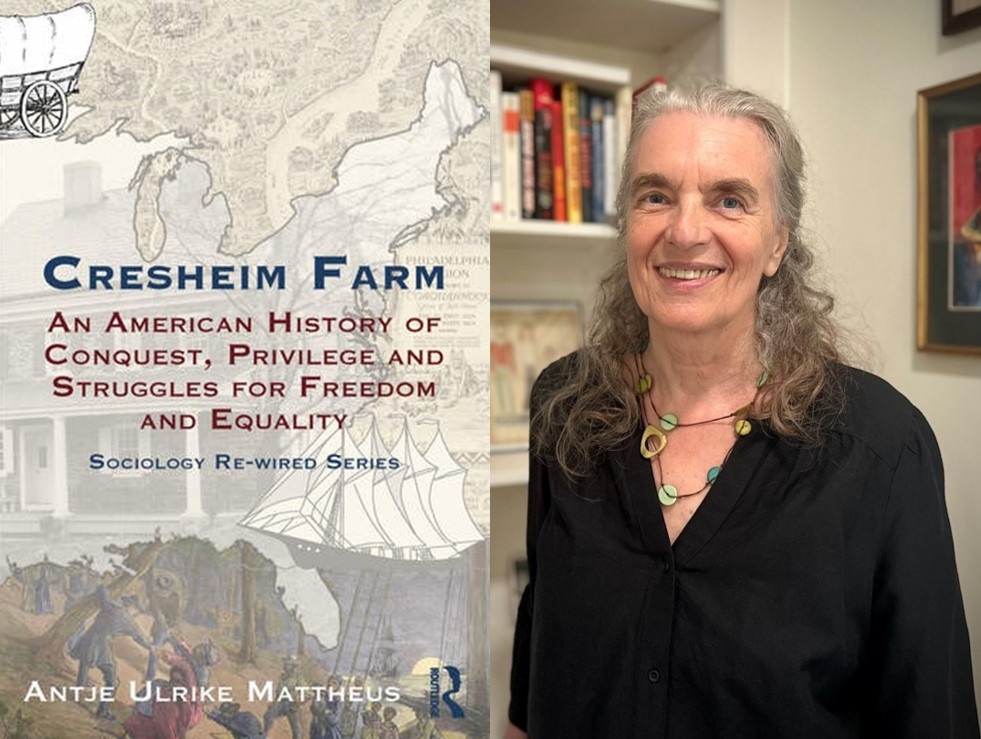On Friday, October 4 at 2:00 p.m., the Social Science and History Department will host Antje Ulrike Mattheus, the author of a unique book on Philadelphia history.
Cresheim Farm: An American History of Conquest, Privilege, and Struggles for Freedom and Equality, which Mattheus refers to as "political archeology," is a deep-dive into the history of the home in Mt. Airy where she and her husband raised their two children, held countless community meetings, and worked to understand and preserve its historical character. Unlike the typical old Philadelphia house, however, this property dates back more than 300 years, when it was founded by German immigrants in what was still the borough of Germantown before its 1854 incorporation into Philadelphia.
Mattheus, herself born in Germany before moving to the U.S. to work for the United Farm Workers, begins her story even earlier than the founding of Cresheim Farm. She starts with a portrait of the Unami Lenape people, then takes us through European colonization of the region, the Quaker and Mennonite settlement of what’s now Northwest Philadelphia, and through a variety of owners of Cresheim Farm, from abolitionist activists to a union-busting lawyer to the first female editor of the Saturday Evening Post. Throughout, she’s attentive to the cultural contradictions and struggles around race, ethnicity, and class, treating readers to a deeply researched account of this single piece of land. The book is a history of the United States in miniature.
Social Science and History librarian Ben Remsen interviewed Mattheus about her book in advance of the October 4th talk. You can register in advance for the talk, though it’s not required for attendance.
I’ve been telling people to come to this talk because it’s about a great book of local history. But several times throughout the book you refer to it as “political archaeology.” What does that term mean for you and how does it apply to this book?
Our present, very complicated, politics, have their origin in the past. Using Cresheim Farm as one of the oldest European buildings in the area, we can “dig down” layer by layer through owners and inhabitants to explore historic, social, and political developments. The history of Cresheim Farm and the people who lived on the land help us understand how formal and informal political systems were developed. The book is not just of local interest, but, because Philadelphia played such an important role in the development of the colonies and later the U.S., it is of interest to many others. It shows how an empire is built.
As you researched the many different periods in the life of the house that you used to own, what surprised you the most to learn?
I had many surprises. For example, 17th-century Lower Rhine Mennonite families were recruited by William Penn to Quakerism and to join the American colony from German-area Mennonite churches. Therefore, the same Germantown area families often had Quaker and Mennonite members. At first, I was unable to find information about Margaret and Cornelius Tyson [the first people to build on the land that became Cresheim Farm], until I researched them in Mennonite archives.
I learned that Philadelphia’s colonial economy – banking, shipping, insurance, production, and sale of slave-produced products – depended on the goods produced by southern large-scale slavery. Some Philadelphia and Germantown families owned large slave plantations in the South.
This is quite an unusual approach to history, drilling deep down into one location throughout recorded time, rather than focusing entirely on one era. Are there other books that take this approach, or other scholars whose work inspired what you wrote?
Yes, for example, books by Michael Omi and Howard Winant, Eli Anderson, Matthew J. Countryman, Marcus Hunter, and Zandria Robinson. There are many books that research cities and buildings, but I have not found any quite like mine, which dig into history and make connections to international events.
Who do you think would be most interested to come to your talk on October 4th and to read your book?
People who are interested in Conquest by Law or racial justice and social movements, sociologists, historians, people interested in the history of class and race and gender, Philadelphians, people who live in Northwest Philadelphia, union members, people interested in labor history, people of German background, people who are interested in researching and understanding their history and that of the places they live in.
Are you a Free Library user? If so, how have you used our collections either in researching this book or in any other way over the years?
Yes. I have used Philadelphia’s library system for close to 50 years. For this book, I visited the history sections in various Free Library locations, especially Northwest Philadelphia, and the Map Collection at Parkway Central Library.
Have a question for Free Library staff? Please submit it to our Ask a Librarian page and receive a response within two business days.

